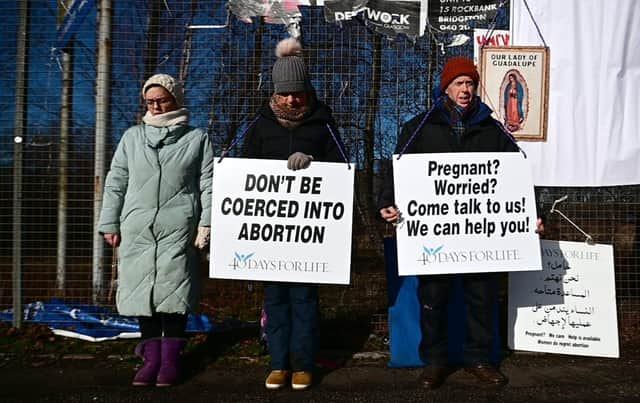Buffer zones Scotland: Healthcare workers "referred to as murderers" while awaiting Scottish Government legislation


Over the weekend, members of Christian anti-abortion group 40 Days for Life gathered outside the Queen Elizabeth University Hospital in Glasgow on Sunday evening for their last vigil after almost six weeks of protests.
Members of the group, which was founded in Texas, USA in 2004, lined up across the road from the maternity unit, with many holding what looked to be small lanterns. Footage of the event was shared on social media, prompting outcry from pro-choice activists in Scotland, and renewed demands for legislation from the Scottish Government.
Advertisement
Hide AdAdvertisement
Hide AdPreviously, the Scottish Government had left local authorities to bring in buffer zones using byelaws. However, local authorities such as Glasgow City Council and Edinburgh City Council declined to introduce byelaws due to legal advice they received, and the possibility of lengthy and costly legal challenges from pro-life groups with wealthy backers, particularly from American Christian groups.
First Minister Humza Yousaf has now committed to introducing national legislation, and says his government will support Scottish Green Party MSP Gillian Mackay’s proposed bill.
Despite the bill being introduced by Ms Mackay in May 2022, the government has still not introduced the legislation, and is unlikely to do so this calendar year.
Lucy Grieve, of buffer zones campaign group Back Off Scotland, said Scotland is now lagging behind the rest of the UK in protecting women who are accessing healthcare.
“We're now like the sole nation in the UK that doesn't have any protection for those people trying to access the services, and for the staff as well” said Ms Grieve.
“We're really lagging behind on this, it's not a great place to be.
“We hear from so many people now, because the issue has got more attention and because Humza Yousaf said in his election campaign that he was going to strengthen rights, which is great, but we're just at a point where just no action being done and I can't for the life of me understand why it's taking so long for the government to even introduce the bill.”
Ms Grieve added that “everybody's saying exactly the right thing, but there's just a complete lack of on-the-ground progress”, and said the heavily-publicised summits held by Nicola Sturgeon were just “talking shops” that have not led to action.
Advertisement
Hide AdAdvertisement
Hide AdDr Greg Irwin, a consultant at Glasgow Children's Hospital, took to social media to criticise the protest happening outside the QEUH.
“These people are here to bully women coming into the hospital and seeking abortion healthcare,” said Dr Irwin.
“That's completely out of order.
"So, Mr Yousaf, I know you've got a lot on your plate, but the bill's already making its way through parliament.
“I would very much appreciate your help in getting it in to law as soon as possible so that Scotland can catch up with the rest of the UK and bring in buffer zones to protect our sisters and our daughters.”
Meanwhile, Ms Mackay said the images of around 200 lantern-wielding protestors outside Queen Elizabeth University Hospital were “sickening”.
“If they thought this would help their cruel US imported ideology then it has backfired spectacularly,” said Ms Mackay.
“All they have done is make the case absolutely for speeding up the introduction of safe access zones.
“They have galvanised support around my bill with a flood of messages to my office in the past 24-hrs from people asking what help they can offer to speed up its introduction.
Advertisement
Hide AdAdvertisement
Hide Ad“This is not about freedom of speech, this is absolutely about protecting the rights of women to choose, to be protected and to feel safe when accessing healthcare. It is about supporting staff and clinicians to do their job without fear.
“The 40 Days doctrine is at odds with that, it surely borders on criminality and such displays must be brought to an end. I hope it can be the last time people are forced to endure such repugnant scenes.”
Asked whether he’ll support Mackay’s bill, Mr Yousaf told Bauer Media his government will “do everything we can to bring safe access zones as quickly as we possibly can”.
Mr Yousaf described the scenes outside of QEUH at the weekend as “unacceptable”, and said: “We know that women going for abortions can be one of the most traumatic days of their lives, and to have to face protest - I think it's just not acceptable.
“I’ll work very closely with Gillian Mackay, the member who's bringing forward the bill on safe access zones, and she'll get the full support of the government to take that work forward.
When asked for a timeframe on bringing in the legislation, Mr Yousaf said: “I'll work really closely with Gillian Mackay to see what we can do to bring forward that bill as quickly as we possibly can, and to support that bill as quickly as we possibly can.
“You'll forgive me, I'm literally into the first full week as First Minister, but I intend to have that discussion with Gillian Mackay as early as I possibly can, because - be in no doubt at all - I find the scenes that we saw over the weekend not to be acceptable.”
In the meantime, women and healthcare staff are “very distressed” by the protests, said Ms Grieve.
Advertisement
Hide AdAdvertisement
Hide Ad“We've seen much more of an uptick in people speaking out,” Ms Grieve added, “who are actually staff members at these facilities that have also had an abortion, or had a miscarriage, or have had to have some sort of reproductive treatment and they're obviously very distressed.
“They have the double element of having to come into work everyday and being referred to as a murderer, and having to see that every day for 40 days.”
Comments
Want to join the conversation? Please or to comment on this article.